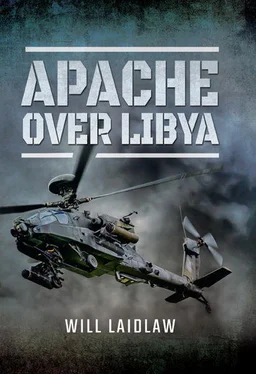Gaddafi was on the run. Khamis had been killed, by an Apache, or so the regime said. Moussa Ibrahim was silent, his brother killed, again by an Apache, or so the regime said. [17] It is very difficult to measure ‘cognitive effect’ – the degree to which the regime feared the Apache. However, when Khamis Gaddafi was allegedly killed on 29 August the regime announced he was killed by an Apache. This was reported by CNN and Sky among others. Hassan Ali Ibrahim, brother of government spokesman, Moussa Ibrahim, was killed in Az-Zawiyah on 18 August. Moussa Ibrahim blamed the Apache once more and again this was widely reported in the international media. Whatever the truth in this, it is clear the regime feared us
The inner circle were running for their lives and the Apache was being cited as their nemesis. Tripoli fell first. Brega and Zlitan came next. There was no place for us in the confusion that followed, and we stayed afloat, an option waiting for politicians to time our redeployment home.
A whole new team had trained to replace us: 664 Squadron spent the summer flying from HMS Illustrious back home. They had two tasks – be ready for Libya and be ready for Helmand. By the end of August there was no more need for the Apache, but politicians pondered, and no decision was the best decision, so 664 got on the bus. They came out to Ocean . We trained together. We planned. The CAOC hinted at Bani Walid. We did our calculations and the engineers installed extra fuel tanks. We were ready, Hellfire, guns and fuel. They eventually said ‘no’ again. Then it came. At about half past two one busy Thursday afternoon in late September the Captain piped the end of our Ellamy commitment. We could be home by the weekend. Time to pack, so we did. All ready. Plane booked and Ocean made best speed for Crete.
We had one last day of work in the flip-flop, processing all our reports, writing everything down, storing guntape, getting the Operational Record ready. Then a last blast in the wardroom and a signal from the Commodore: ‘BZ to the Apache team.’ [18] ‘Bravo Zulu’ – ‘Well done’ in Navy parlance. To receive a ‘BZ’ by Signal from the Commodore was high praise
It was the end of war for us. A man called Dave, plucked from the desert by the SBS in February, tracked down by the Navy, flown out to us, boiler-suited and stained with decades of oil and grime, hammered the tired diesel generators into action and Ocean tracked for Crete. The Navigator said 20 hours. We were ready to go home.
We had survived. On that last night, sailing back to Crete, in a quiet moment on the quarterdeck with Wings I remarked, ‘When we got into this, we didn’t know how it would unfold. After those first three or four missions, I expected someone to come unstuck. Now that we haven’t, I can’t quite see how we all made it, but this is an enormous relief.’
‘Yes it is, isn’t it. But it’s changed you, all of you. I can see that. This is going to stay with you for a long while. Cracking job though, cracking job.’
Chapter 15
Six Weeks Later
‘Never smile when you pack your bags.’ Advice from JB on how to keep a happy marriage in the Army. Going away on operations is a challenge we relish. We are about to do our jobs in an unforgiving environment where all our training will be tested. Going away is exciting for the soldier, but anyone at home watching us pack is in a very different place. We have a sense of mounting excitement; they are faced with the big dark space of monotony, hard work and single parenting, bills, insurance renewals, the school run, work, poorly animals and no reward. No thanks or acknowledgement, they are just expected to get on with it. Meanwhile, we are flying the best helicopter in the world in the most demanding places, with our friends. When we are packing our bags we are already there. In our minds we’ve left home and made the journey. Those we leave behind have none of that nervous anticipation; they are developing coping mechanisms to fill the space, to deal with the unrewarded hard work. We try and make the most of the final few days together, but we are in separate worlds. We argue. We fall out. We make up. Then the soldier leaves again.
After a while, perhaps a few months, the excitement begins to wane and we yearn for home. At home, life has established a new way to fill the space. Phone calls are matter of fact, seldom private and often finished without saying enough of what we feel. Then we edge towards the end. The tour comes to a close, planned or surprise, and we head home.
HMS Ocean came alongside in Chania, Crete on 24 September and the job was done. Ocean and the Apaches had completed their part in Operation Ellamy. It was time to go home, and the departure was rapid – no time for ceremony or celebration. I wanted to mark it somehow, but there wasn’t time, apart from a quick gathering and my words of praise to the eighty-three men and women who had changed the way we operated and carried us to success.
This composite team, put together in part due to availability and in part because of their skills, could not last beyond the success of the operation. We should have gone our separate ways in June 2011, but extraordinary circumstances in North Africa created an opportunity to test us operationally and kept us together to see it through.
The squadron gathered in the galley. I was sad inside, proud on the outside. I was louder than normal. I told them they’d made history, they’d been brave, they’d defied the odds in combat. I asked them to hold their heads up high but wear it modestly. I warned that sceptics would come their way, sometimes out of envy, sometimes accompanied by malice; but whatever they encountered, good or bad, they knew the truth of their industry and they should be proud. I knew this was it, the last time we would be together. The work was done, and finally they were heading home. Our six-week exercise had stretched to twenty-two weeks of an unscheduled operational tour in a new environment for everyone on the team. No one had done this before; they were the only ones. The Sergeant Major brought everyone to attention; I thanked them all and walked away. This was the end of command. The end of unusual conflict. The end of my team, my unique, complicated and courageous team.
That night a last blast in the wardroom, the rec rooms, the quarterdeck and wherever else blurred into panic packing, printing, copying, shredding and readying. By breakfast on 25 September all were ready to move, packed, Post-Operational Report drafted, guntape secured and all longing for home.
They stood on the quayside and waited for coaches to take them to the airport. A rugby ball was passed about, some lay on their bags in the sun. The smokers smoked. The on-ops smokers smoked. Sunglasses and smiles all round. Phones on ears.
I leant on the quarterdeck with Little Shippers, Charlie, Mark and Doug, our eyes on the homebound team. Our bags weren’t packed. We didn’t leave. We five, ten of our ground crew and a fresh team of engineers stayed.
On the quayside three coaches arrived, bags were hauled upon shoulders and they were gone.
‘Let’s go make a plan,’ someone said. And we went down to the flip-flop and unrolled a new set of maps. We sailed east the same night, but that’s another story.
* * *
The rest of the squadron flew home. Those who remained on board followed about a month later, and Ocean , having sailed 24,000 nautical miles, eventually came alongside in Plymouth on 9 December. Her 310-strong crew had spent 279 days at sea in 2011 carrying another 300 personnel with them. Just 87 of those days were spent on the line committed to the Libya operation; such is the extent and diversity of the tasks our ships conduct at sea. That year Wings managed 13 helicopters and safely brought back almost 3,000 deck landings; and, if there is another statistic worthy of historical record, it is that the ship’s dentist performed 256 fillings!
Читать дальше












